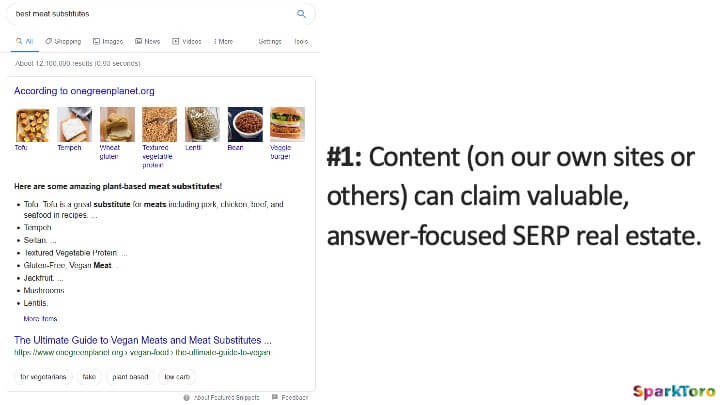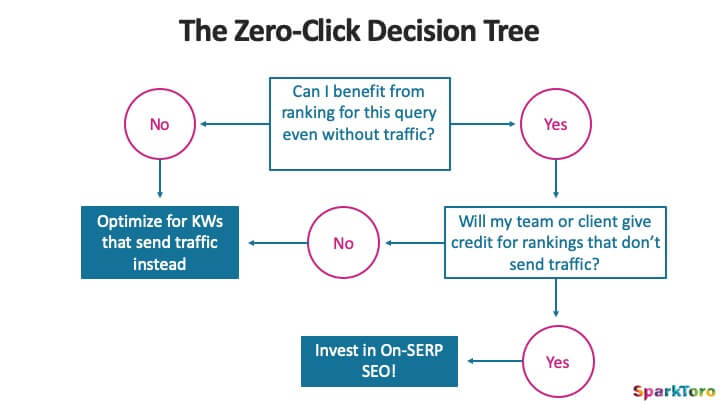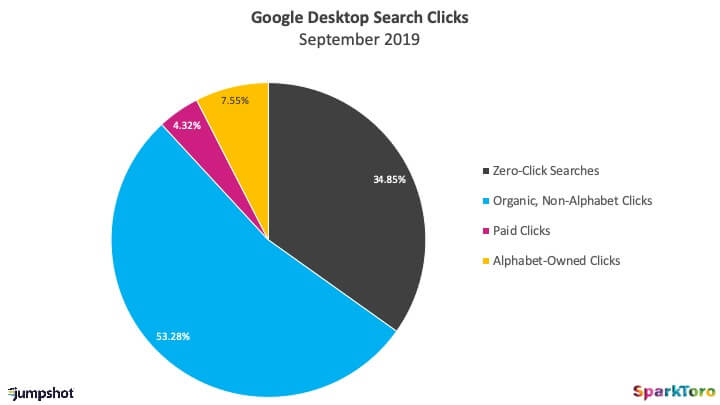NEW YORK – Google’s relationship with brands has shifted from referrer to competitor, SparkToro CEO and co-founder Rand Fishkin said at SMX East on Wednesday during his keynote about how the search engine’s business model has been evolving.
Now that the majority of Google searches are no-click, companies will have to find on-SERP opportunities to reach their audiences and strengthen their branding so that users will actively seek them out, said Fishkin.
The zero-click search trend
More than half (56.1%) of Google searches conducted from a mobile browser and 34.9% of Google desktop searches ended without a click to other content, according to Jumpshot data. “However, the trend is the same: organic, going down; while paid and zero-click searches are on the rise,” said Fishkin.
“In September, 7.5% of all searches resulted in a click to an Alphabet property,” said Fishkin. “Google is the biggest beneficiary of Google Search today. Nobody else comes close to that 7.5% number.”
From middleman to “competitor”
In addition to organic click volume eroding, Google’s direct answers and its foray into verticals resolves searches in numerous industries, such as weather, travel, local, and reviews, without the user ever having to click through to the sites that originally published that information.
“This is widespread, friends,” said Fishkin, citing results from Google Hotels, Flights, Jobs, the local pack and other types of rich results surfacing on the main results page. “We are talking about results that are taking business away from Skyscanner and Kayak in travel, from Eater and Yelp in local results, from U.S. News and FiveThirtyEight in the college rankings, from Wunderground and Weather.com, from MetaCritic and PC Gamer, and basically everybody but Alphabet when it comes to a lot of popular culture and media stuff.”
What brands can do about it
“We have to find ways to make our brand what searchers seek out,” said Fishkin. “I don’t want searches for ‘weather’; I want searches for my brand: I want searches for ‘Weather Underground’ and ‘Weather.com’ and ‘Weather Channel.’ I want to find ways to benefit from zero-click searches.”
Despite the bleak outlook for organic traffic in certain industries, there are still a number of ways that brands can influence what Fishkin refers to as “post-search behavior.”

Designing content with rich results in mind is one way companies can increase their visibility on the search results page — what Fishkin refers to as and “on-SERP SEO” — and the attribution from those results may help familiarize users with your brand. Buying ads will also help you do this, Fishkin said.
Offline brand campaigns, such as billboards, radio and TV ads can also influence search behavior. If users are actively seeking out your brand, claiming or suggesting changes to your knowledge panel can help you positively influence brand perception. To bolster your brand even further, Fishkin recommended reputation management SEO to help control branded search results.
The prisoner’s dilemma for brands
“The prisoner’s dilemma is ‘Do I optimize for zero-click searches, for providing these answers, for marking my results the way Google wants them — and potentially losing traffic as a result?’” said Fishkin, highlighting the predicament that many brands are now finding themselves in.

Fishkin’s mechanism for navigating this dilemma divides the issue into two categories: one for all types of content that can surface as a rich result (above), and another specifically for search results derived from structured data (below).

“All of us have to try and build walls to protect against the competition that will absolutely come to sector after sector from Google as they search for growth … that is just the reality,” said Fishkin. “But, I think we have an opportunity to build our own brands and still succeed.”
Relying on search engines to reach your customers inherently makes brands susceptible to the way those search engines deliver results. However, by complementing your SEO efforts with a strategy that creates demand for your brand, you may be able to insulate yourself and stay ahead of the competition.

